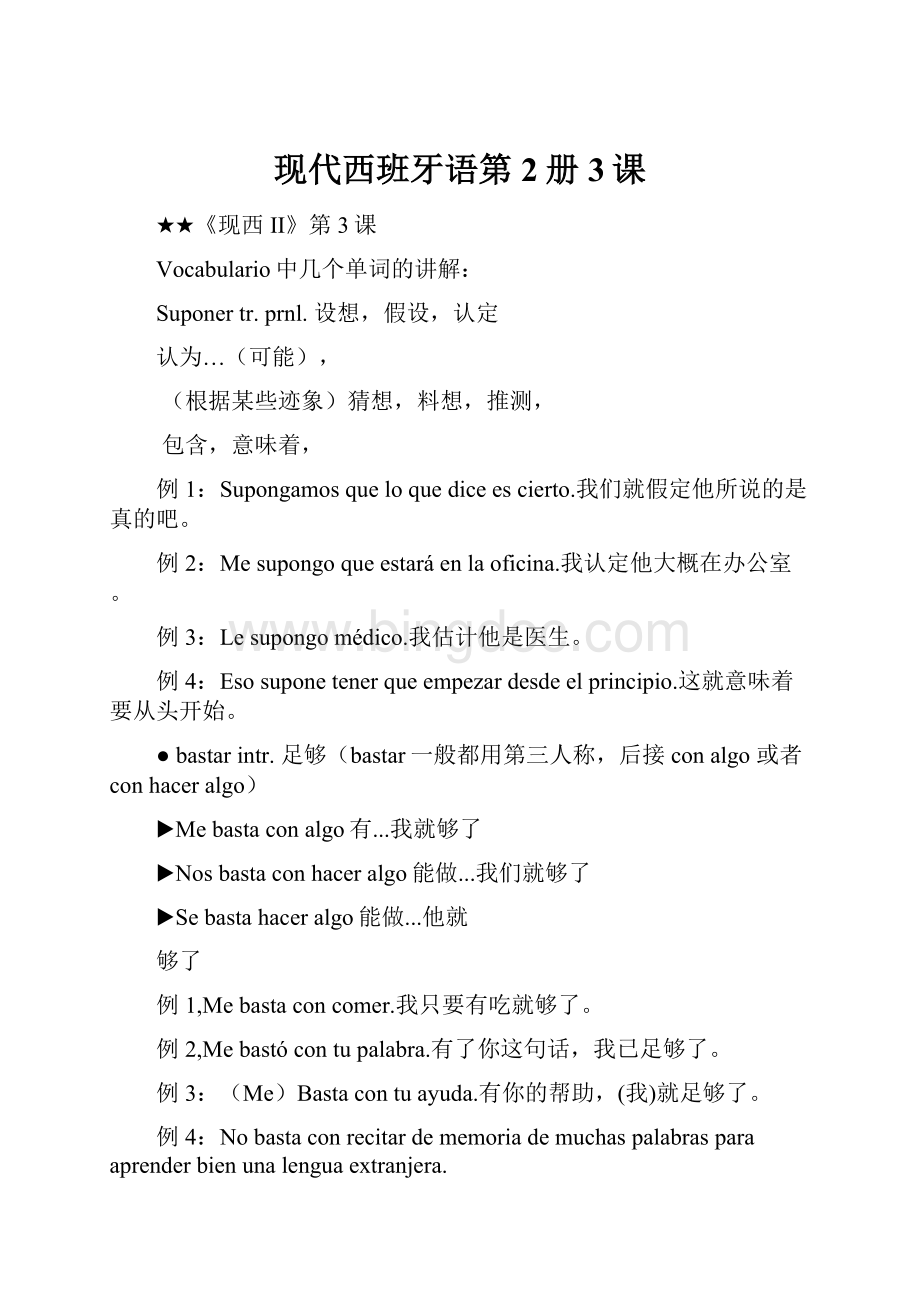现代西班牙语第2册3课.docx
《现代西班牙语第2册3课.docx》由会员分享,可在线阅读,更多相关《现代西班牙语第2册3课.docx(15页珍藏版)》请在冰点文库上搜索。

现代西班牙语第2册3课
★★《现西II》第3课
Vocabulario中几个单词的讲解:
Suponertr.prnl.设想,假设,认定
认为…(可能),
(根据某些迹象)猜想,料想,推测,
包含,意味着,
例1:
Supongamosqueloquediceescierto.我们就假定他所说的是真的吧。
例2:
Mesupongoqueestaráenlaoficina.我认定他大概在办公室。
例3:
Lesupongomédico.我估计他是医生。
例4:
Esosuponetenerqueempezardesdeelprincipio.这就意味着要从头开始。
●bastarintr.足够(bastar一般都用第三人称,后接conalgo或者conhaceralgo)
▶Mebastaconalgo有...我就够了
▶Nosbastaconhaceralgo能做...我们就够了
▶Sebastahaceralgo能做...他就
够了
例1,Mebastaconcomer.我只要有吃就够了。
例2,Mebastócontupalabra.有了你这句话,我已足够了。
例3:
(Me)Bastacontuayuda.有你的帮助,(我)就足够了。
例4:
Nobastaconrecitardememoriademuchaspalabrasparaaprenderbienunalenguaextranjera.
为了很好地掌握一门外语,只背诵许多单词是不够的。
例5:
Sebastaélsoloparaaqueltrabajo.
他一个人足够做那份工作了。
(注意!
表示他(她,您)时,用sebasta...,而非lebasta...)
●olvidartr.prnl.忘记
例1:
Yoolvidésunombre.我忘记了他的名字。
例2:
Nomeolvidodeustedesaunqueestélejos.尽管我在遥远的地方我也不会忘记你们(注意:
用了prnl.)。
例3:
Olvidóllamarme.他忘了给我打电话了。
(注意结构:
olvidarhaceralgo)
例4:
Seolvidómuyprontosuprimeramujer.他很快就忘了他前妻。
(注意是做prnl动词)。
●olvidarprnl....被忘记(动词用第三人称,句子里有间接补语me,te,le...等。
此用法请参照已讲过的ocurrirsele的用法。
此类句子属于特殊句型,但要按“自复被动句”来理解)
例1:
Seleolvidómicumpleaños.他忘了我的生日。
例2:
Semeolvidabadecirtequemañananopodrévenir.我忘了告诉你明天我不能来。
例3:
Noseteolvidetraermeellibromañana.你别忘了明天给我带书来哦。
例4:
No,novinoFelipe,porqueseteolvidóllamarloportelefono.不,飞利浦没来,因为你忘记打电话给他了。
总结:
olvidar(忘记)这个词一般可以用三种结构表示相同的意思:
例如1:
alquienolvidaralgo某人忘记某事
alquienolvidarhaceralgo某人忘记做某事
例如2:
Olvidarselealgo
(algo是主语,与ocurrirsele属于一类)
Olvidarselehaceralgo某人忘记做某事
例如3:
alguienseolvidadealgo
alguienseolvidadehaceralgo
举例:
我忘记他的电话号码了。
(可以翻译成以下三个句子,请注意句中动词的用法)
1,Olvidésunúmerodetelefono.
2,Semeolvidósunúmerodetelefono.
3,Meolvidédesunúmerodetelefono.
●evitartr.prnl.防止,避免,
回避,躲避
例1,evitarlaextensióndelaepidemia防止传染病蔓延
例2,evitarbeberalcohol回避(避开)喝酒
例3,Ellaevitabamimirada.她避开我的目光。
例4,evitarhaceralgo避免做某事=不做某事
例5,Vaaevitarsecompraruncochenuevo.他将不会买(回避买)新车(prnl.)。
◆Gramática语法
▶P56,背诵几个不规则动词虚拟式
•poner
pongapongasponga
pongamospongáispongan
•salir
salgasalgassalga
salgamossalgáissalgan
•tener
tengatengastenga
tengamostangáistengan
•traer
traigatraigastraiga
traigamostraigáistraigan
•entender
entiendaentiendasentienda
entendamosentendáisentiendan
•pensar
piensepiensespiensepensemospenséispiensen
•empezar
empieceempiecesempiece
empecemosempecéisempiecen
•estar
estéestésesté
estemosestéisestén
•ir
vayavayasvayavayamosvayáisvayan
•ser
seaseasseaseamosseáissean
▶P58,背诵几个不规则副动词:
decir—diciendo
dormir—durmiendo
morir—murmiendoPedir—pidiendo
poder—pudiendo
seguir—siguiendo
servir—sirviendo
venir—viniendo
vestir—vistiendo
★★课文中某些句子的讲解:
▶P49,línea2
ComportamientosqueseconsiderannormalesenChina,puedenresultarchocantesenotrospaíses.在中国人们认为很正常的行为可能在其它的国家就会被认为很怪异。
•considerar+直宾+adj.=认为某事...
•consideraralgonormal认为某事很正常
•consideraralgochocante认为某事很奇怪
▶considerartr.prnl.思考,斟酌,细想,
认为,把...看做,想象,设想
例1:
considerarlasconsecuenciasquepuedetraerelproblema考虑一下那问题将会带来的后果
例2:
Laconsideramosunamujermuyinteligente.我们认为她是一位很聪明的女士。
例3:
Considerodifícilquenosveamosestatarde.我认为我们要在今下午见面会有困难的。
例4:
Seconsideraunhombrecapazeinteligente.(considerarseprnl.自认为...)他自认为他是个聪明能干的人。
例5:
Meconsideromuyfeliz.我自认为我是很幸福的。
例6:
Nosconsideramosestudiosos.我们自认为我们学习很用功。
▶resultarintr.产生结果,产生效果,
是...的结果,
结果证明是...,
结果好(不好)
例1:
Tratédeconvencerlo,perono
resultó.我试图说服他,但没结果。
例2:
Deaquelprimerencuentro,
resultóungranamistad.从那第一次见面之后,便产生了伟大的友谊。
例3:
Elplannovaaresultarbien.这
项计划将不会产生好结果。
例4:
Laexposiciónresultóunéxito.展览会结果很成功。
例5:
Laconferenciaresultópesada.这个会议结果被证明是冗长乏味的。
▶P50,Línea1,2,
•leeconatenciónestosconsejos
•leeralgoconatención
•escucharalgoconatención
•haceralgoconatención聚精会神做某事
▶“向某人提问”的表达方式:
•preguntaraalquien
•hacerpreguntaaalqien
•Nolespreguntes...你别向他们提...
问题啊。
(注意:
命令式的否定式动词用虚拟式)
•Nolespregunte...您别向他们提...
•Nolespreguntéis...你们别向他们提...
•Nolespregunten...你们别向他们提...
•Nolespreguntemos...我们别向他们提..
▶elogiartr.赞扬,表扬,夸奖
•elogiarauno表扬(夸奖)某人
•elogiarunaobra称赞一部作品
•Noselogiaronporelesfuerzorealizado.他们赞扬我们所作出的努力。
(比较英语:
praisesb.forsth.表扬某人某事)
▶P50,Línea12
...notelimitesaagradecerle.
...你别只限于说声“谢谢”就完了
•limitartr.intr.prnl.划定界限(线),交界接壤,局限于,
•例1:
Construyóunamuroparalimitar
suhuerto.他建造了一堵围墙为他的菜园划定了界线。
•例2:
PerúlimitaalnorteconEcuadoryClombia.秘鲁北部与厄瓜多尔和哥伦比亚接壤(交界)。
例3:
limitarseahaceralgo仅限于做某事,只做某事,
例4:
Melimitéacumplirsusórdenes.
我只限于执行他的命令。
例5:
Cállateylimítateaobedecerme.
住嘴,你只许服从我。
•limitarseaalgo限定某事
例1:
Selimitaasusalario.他只用工资。
例2:
limitarseamilpalabras只限一
千字。
▶agradecertr.感谢,谢谢
•agradeceraunoalgo感谢某人某事
•Leagradezcomucholainvitación.
非常感谢您的邀请。
•Ellaleagradeciósusconsejosaél.
她感谢他给出的忠告。
▶P50,Línea15
•porelmomento=demomento
眼下,目前,暂时
•enestemomento现在,刚刚,此刻
•enesemomento正在那时,正在那一刻
•Unmomento,porfavor.请稍等片刻。
•desdeesemomento从那时起
•encualquiermomento=atanymoment
马上,在任何时候,随时
•enelmomento=atthemoment
眼下,立即
▶P50,倒数4行
•Elabuelitonoseencuentrabien
estosdías.爷爷这两天身体不舒服。
•encontrarseprnl.处于(某种位置或某种境地或状态)
例1:
SeencuentraenMéxico.他在墨西哥。
例2:
Seencuentramuysola.她孤身一人。
例3:
Noseencontrabadebuenhumor.他当时心情欠佳。
例4:
Meencuentromuchomejor.我(身体)好多了。
•encontrartr.找到,遇到,碰到
例1:
Encontréellibroqueperdí.我找到了丢失的那本书。
例2:
Encontréatuprimoenlacalleayer.昨天我在街上碰到你表兄了。
▶P51,Línea2
Luegoloponéisatodovolumen.然后你们会将音量开得很大。
•ponertr.发动,开动(电视,收音机,闹钟等)
▪ponerlaradio开收音机
▪ponerdespertador开闹钟
▪poner(=encender)eltelevisora
todovolumen将电视音量开到最大档
▪Élescuchalamúsicaavolumenalto.他听音乐将音量调得很高。
▶P51,Línea6
•Osvaisaensuciarloszapatosy
laropa.=Vaisaensuciaros
loszapatosylaropa(avosotros).
你们会把鞋子和衣服弄脏的。
▶ensuciartr.prnl.弄脏,弄污
例:
•ensuciarlasbotas弄脏靴子
•ensuciarlacalle弄脏街道
•Noteensucieselvestido.你别把衣服弄脏了。
(命令式的否定式用虚拟)
★★EjerciciosP60,III
1,Venamioficina(命令式的肯定式).
Novengasamioficina(注意:
命令式的否定式用虚拟式现在时,而且句子的排列顺序跟命令式肯定句不一样,还应该特别注意:
宾语和与格代词的位置).
2,Dígannoslo.你们告诉我们这事吧
Nonoslodigan.你们别告诉我们这事
3,Levántense.您们起床吧
Noselevanten.您们别起床
4,Póntelo.你穿上这个(abrigo)吧
Notelopongas.你别穿这个(外套)啦
5,Mírelo.您看这个吧
Nonolomire.您别看这个了
6,Háganlo,porfavor.你们做这件事吧
Nolohagan,porfavor.你们别做这件事
7,Saldeaquí.你从这儿滚吧
Nosalgasdeaquí.你别走
8,Cuéntaselo.你跟他们说这事吧
Noselocuentes.你别跟他们说这事
9,Escríbanme.你们给我写信吧
Nomeescriban.你们别给我写信
10,Abranlasventanas.你们开窗户吧
Noabranlosventanas=Noabréislosventanas.你们别开窗户
★★★★P61,IV
1,你给我打电话吧
Llámame(porteléfono).
Nomellames(porteléfono).
2,把这个写在你的本子上
Escríbeloentuagenta.
Noloescríbasentuagenta.
3,咱们上床睡觉去吧
Acostémonos.(注意省略-s)
Nonosacostemos.(-s不能省)
4,这是我买的杂志。
你给路易斯寄去吧
Éstaeslarevistaqueacabodecomprar.
EnvíalaaLuis.
NolaevíesaLuis.
5,我们就干这个工作吧
Hagámoslo.
Nolohagamos.
6,请大家记住这个
Recuérdenlo.
Nolorecuérden.
7,您就表扬他们吧
Elógielos.
Noloselogie.
8,你们感谢我吧
Agradecedme.
Nomeagradezcáis.
9,咱们忘了他的话吧
Olvidemossuspalabras.
Noolvidemossuspalabras.
10,这是电视机,打开它吧
Ésteeseltelevisor.
Enciéndelo.
Noloenciendas.
★★★★P62,V
Abogadooingeniero
Avanzaroaparcar
Ésteuotro
Televisiónopelícula
Libreuocupado
Primaverauotoño
Tardeotemprano
Servillanasoflamenco
Septiembreuoctubre
Clarouoscuro
Campesinosuobreros
Arribaoabajo
aquíoallí
recordaruolvidar
fregaruordenar(擦洗或整理)
★★★★P63,VII
detenerse(阻止,):
deteniéndose
oír:
oyendo(正字法)
saludarlo:
saludándolo
explicársela:
explicándosela
vestirse:
vistiéndose
ir:
yendo(正字法)
leer:
leyendo(正字法)
traer:
trayendo(正字法)
★★P66,XII
1,Creoqueeltextoesdemasiadolargo.
2,¿Todavíarecuerdasaquelpartidodebaloncesto?
3,Elorador(演讲者)sequitóelabrigo,sesentóenlasillayempezóahablar.
4,Acabamosdehablardeesteproblemaconellos.
5,Aquelmuchacholerecordóasuhijo.
6,Caminaronhastaunaesquinadondeencontraronunhotel.
7,Creoquetodvíapuedesreconocerlo.
8,Ademásdeinglés,sabenhablarfrancésy
alemán.
9,Hagaelfavoerdehablarenchino.Sino,ellasnovanaentender.
10,¿Quiéneselseñorqueacabadesalir?
★★★★P68,XV
1,Amedianocheseoyeronruidoseneljardín.
2,Estasfloresserieganunavezalasemana.
3,Secelebróunafiestaelpasadofindesemana.
4,Estaspoesíasserecitanfrecuentementeenlasveladas.
5,Enaquelentoncesnoseponíanesasinyecciones.
6,Estasentradasseconseguieronayer.
7,Lasrevistasserepartieronentrelosestudianteshacedías.
8,¿Sabescómopreparaesteplato?
9,Enaquelentoncesennuestrohuertonosecultivatodavíaestaclasedehortaliza.
10,Esoschistesnosecuentanalaschicas.
●P69,XVI
1,Sonigualesloshábitosocostumbresentodaslasculturasypueblos?
▶Respuesta:
No,nosonigualesloshábitosocostumbresentodaslasculturasypueblos.
2,ResultanigualmentenormalesunosdeterminadoscomportamientosenChinaqueenotrospaíses?
一些固定的(具体的)行为举止在中国与在别的国家一样被认为是正常的吗?
▶Respuesta:
No,noresultanigualmentenormalesunosdeterminadosconportamientosenChinaqueenotrospaíses.
3,¿Quétiposdepreguntasnosedebenhaceraunapersonaapenasconocida,especialmentetratándosedeunachica,enunpaíshispanohablante?
在说西语国家里,不应该问陌生人什么问题,特别是在面对(称呼)年轻女士的时候?
(tratarsedeuno:
称呼某人。
例1:
Letratande
señoría我们用‘阁下’来称呼她。
例2:
Metratódetonto他叫我傻瓜。
)
▶Respuesta:
Algunaspreguntasnosedebenhaceraunapersonaapenasconocida,especialmentetratándosedeunachica,enunpaíshispanohablante.Porejemplo:
¿Cuántogana?
¿Cuálessusalario?
¿Quéedadtiene?
¿Tienenovio(novia)?
4,¿Sepuedetele